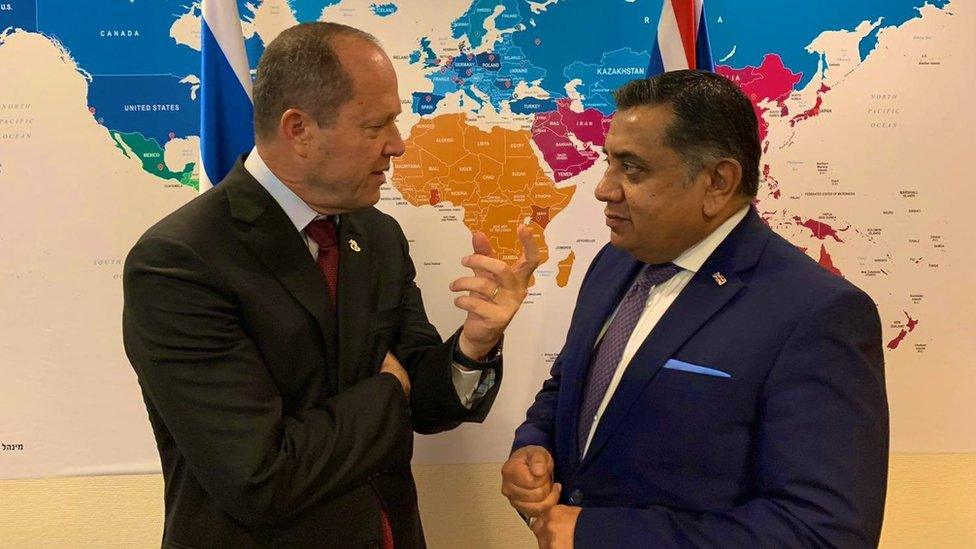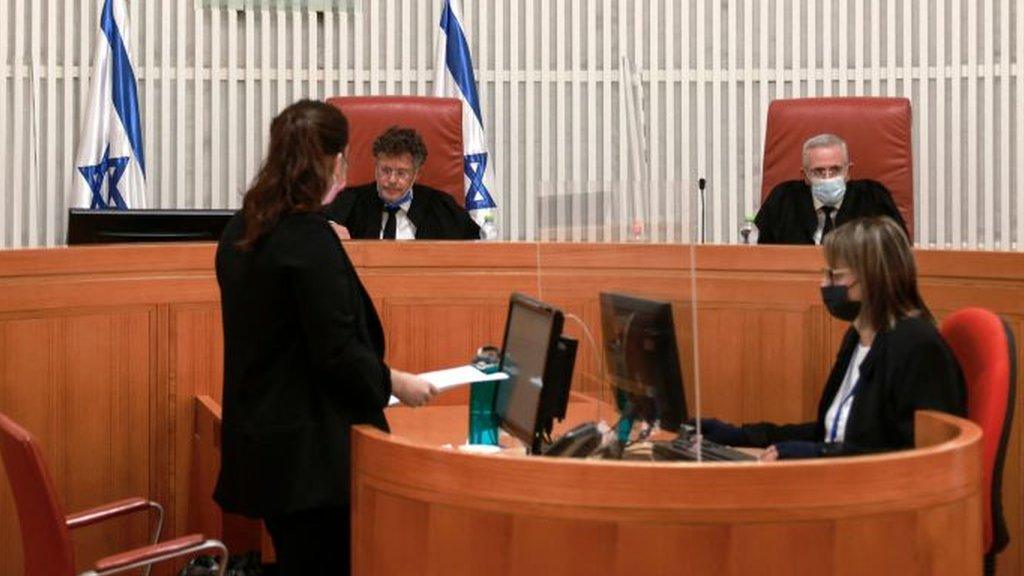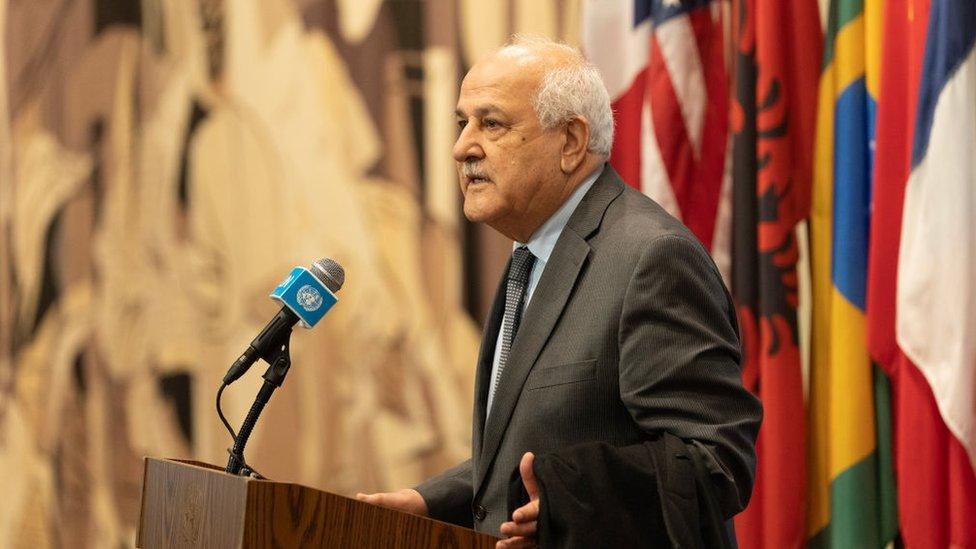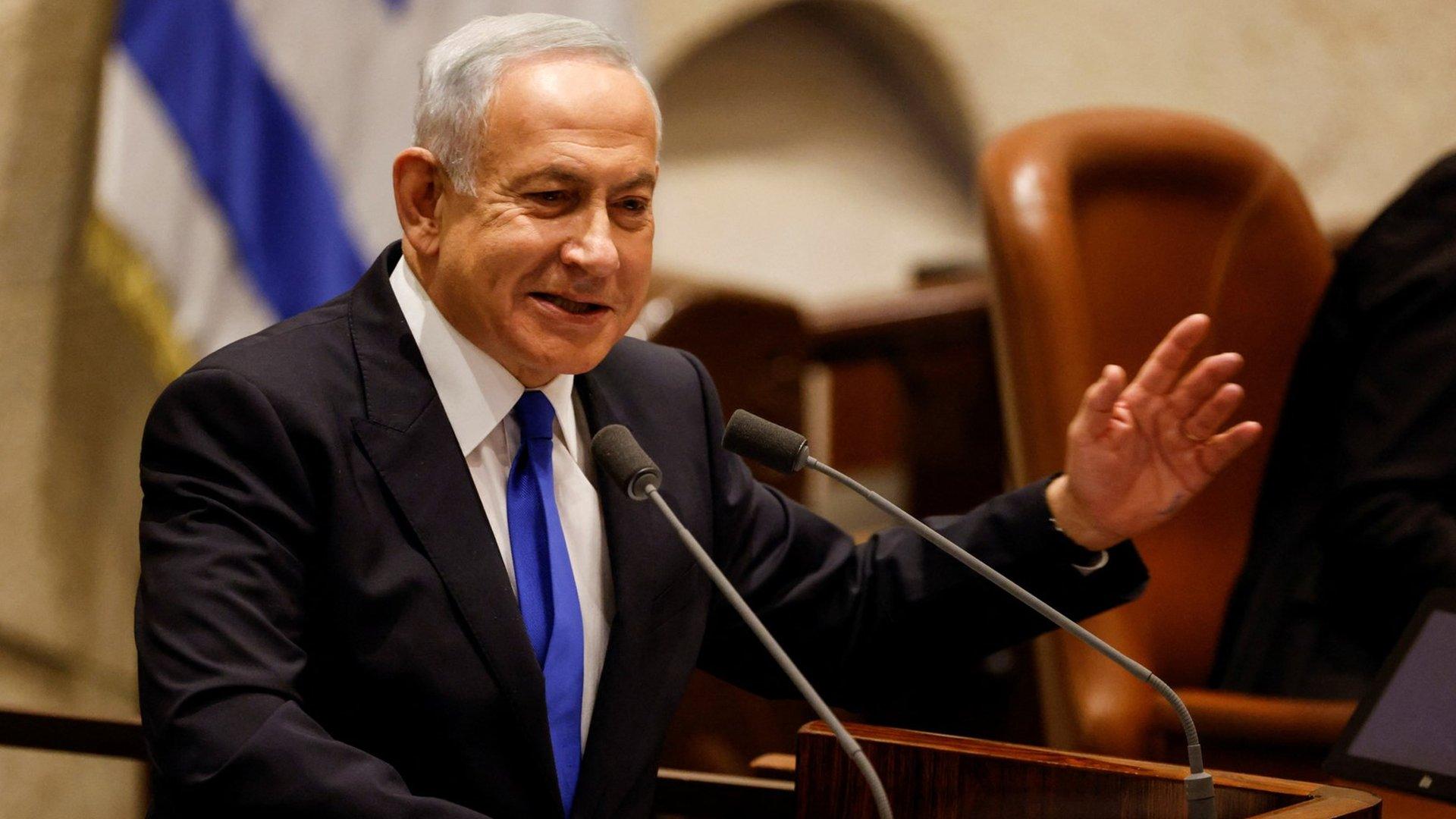UK accused of ignoring extremism over talks with Israel's new government
- Published

UK Foreign Office Minister Lord Ahmad (R) discussed a free trade agreement with Israeli Economy Minister Nir Barkat (L)
The UK has held trade talks with Israel during the first ministerial-level visit to the country since the most nationalist government in its history took office.
The discussions focused on a free trade deal and "regional security issues".
British Foreign Office Minister Lord Ahmad said they took bilateral ties and trade partnership "to new heights".
But a group promoting British-Arab relations accused the UK of "turning a blind eye" to "racist positions".
It follows growing questions over how countries would manage ties with Israel's new government, which includes senior ministers from the ultranationalist far right.
The US said this week it would deal principally with Prime Minister Benjamin Netanyahu, but it added that there was "no boycott" of his coalition as a whole.
Last month, a cross-party group of British MPs urged the UK government not to favour bilateral relations over "grave concerns" about the then-incoming Israeli government's "discriminatory and illegal" policies.
The UK Foreign Office declined to comment on any protocols for trade and defence ties given that a member of the Israeli security cabinet has convictions for racist incitement and supporting a terrorist organisation.
Itamar Ben-Gvir, co-leader of the Religious Zionism alliance and newly appointed national security minister overseeing the police, has previously called for the expulsion of "disloyal" Arabs and the shooting of Palestinians who throw stones.
It is understood that there were no plans for Lord Ahmad to speak to Mr Ben-Gvir or other officials from his ultranationalist party.
On Wednesday, Lord Ahmad met Israeli Foreign Minister Eli Cohen and Economy Minister Nir Barkat, both of whom belong to Mr Netanyahu's Likud party.
Israeli officials said they thanked him for Britain's recent support at the United Nations, where it voted against referring the issue of Israel's occupation of the Palestinian territories to the International Court of Justice (ICJ).
In the coming weeks, further visits to Israel are expected from senior figures including US Secretary of State Antony Blinken and UK Foreign Secretary James Cleverly.
'Enormous concerns'
After taking office, Israel's new government faced condemnation from human rights groups for stating that the Jewish people had "an exclusive and unquestionable right to all areas of the Land of Israel", including the occupied West Bank.
It also pledged to promote annexation of the West Bank, with Mr Netanyahu saying he would choose "the timing and weighing Israel's general national and international interests".
Such a move would be seen as violating international law and would end any remaining hopes for a two-state solution, the long-standing international formula for resolving the Israeli-Palestinian conflict.
The UK-based Council for Arab-British Understanding (CAABU) criticised the substance of the ministerial visit.
"This cosying up process [is] continuing whilst the Israeli government... is proposing to push forward with major [Israeli] settlement projects including legalisation of outposts," said the organisation's director, Chris Doyle.
"Rather than making new deals we should be seeing a British government... saying that pushing forward with these illegal actions would actually carry consequences," he added.

National Security Minister Itamar Ben-Gvir has convictions for racist incitement and supporting a terrorist organisation
Meanwhile, Labour peer Lord Dubs, who signed last month's letter by British MPs, said he hoped the minister would press their views during his visit.
"We have enormous concerns about the potential for great harm being caused by the new [Israeli] government, great harm to the relations with the Middle East and with the Palestinians," he told the BBC.
"Putting Ben-Gvir in charge of national security is highly alarming because his record is awful, and I'm not sure Netanyahu is going to be strong enough to stand up to him," he added.
In a statement released after his meetings with Likud ministers, Lord Ahmad said he discussed "shared security threats, including Iran's destabilising actions in the region and Russia's unprovoked, premeditated invasion of Ukraine".
He also said he "encouraged all efforts to avoid provocative unilateral actions in Jerusalem and the Occupied Palestinian Territories, which only serve to undermine prospects for a lasting and peaceful solution."
Those comments appeared to follow Mr Ben-Gvir's highly controversial visit last week to Jerusalem's most sensitive holy site - known to Muslims as the Haram al-Sharif and the Temple Mount to Jews - over which the UK had already raised "concern".
'Avoiding confrontation'
Mr Netanyahu has dismissed opposition claims that his coalition threatens democracy and could spark a violent flare-up, saying he has "two hands firmly on the steering wheel".
Last month, US officials reportedly discussed how to manage contacts with the new government, external.

Lord Ahmad also held talks with Palestinian Foreign Minister Riad Malki in Ramallah
Aaron David Miller, a former Middle East negotiator for several US presidents, told the BBC he believed Joe Biden's administration would "go to extreme lengths to avoid a confrontation" with Mr Netanyahu's coalition.
"If they go qualitatively and quantitatively beyond what any Israeli government has gone, and they really provoke, then the administration may have no choice [but to impose consequences]. But we're nowhere close to that," said Mr Miller, who is a senior fellow at the Washington-based think tank Carnegie Endowment for International Peace.
"Biden's priority seems to be in working with the Israelis... on Iran, not on the Palestinian issue," he added.
On Wednesday afternoon, the UK minister travelled to the West Bank where he was due to meet Palestinian officials.
The Foreign Office said he would visit the city of Hebron "to hear about the impact of Israeli settler violence on Palestinian residents", and would travel to the area of Masafer Yatta, where he "will reiterate the UK's opposition to evictions and [home] demolitions".
- Published5 January 2023

- Published5 January 2023

- Published3 January 2023

- Published31 December 2022

- Published29 December 2022
